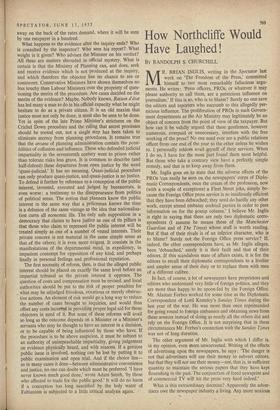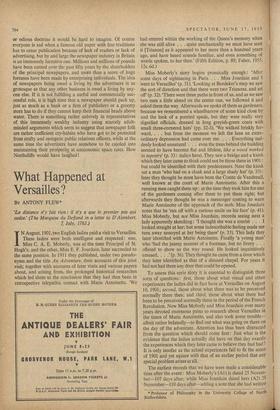How Northcliffe Would Have Laughed!
By RANDOLPH S. CHURCHILL MR. BRIAN INGLIS, writing in the Spectator last week on 'The Freedom of the Press,' committed himself to two most remarkably fallacious argu- ments. He writes : 'Press officers, PROs, or whatever it may please authority to call them, are a pernicious influence on journalism.' If this is so, who is to blame? Surely no one save the editors and reporters who succumb to this allegedly per- nicious influence. The proliferation of PROs in such Govern- ment departments as the Air Ministry may legitimately be an object of concern from the point of view of the taxpayer. But how can it be validly argued that these gentlemen, however numerous, overpaid or unnecessary, interfere with the free working of the press? No one need ever see a public relations officer from one end of the year to the other unless he wishes to. I personally seldom avail myself of their services. When I do so, I have for the most part found them most helpful. But those who take a contrary view have a perfectly simple remedy, and that is to keep away from them.
Mr. Inglis goes on to state that the adverse effects of the PROs 'can easily be seen on the newspapers' corps of Diplo- matic Correspondents, once the cream of the profession, now (with a couple of exceptions) a Fleet Street joke, simply be- cause the Foreign Office press service is so insidiously efficient that they have been debauched; they need do hardly any other work, except attend embassy cocktail parties in order to pass information on for the gossip column.' I believe Mr. Inglis is right in saying that there are only two diplomatic corre- spondents (I assume he means those of the Manchester Guardian and of The Times) whose stuff is worth reading. But if that of their rivals is of an inferior character, who is to blame? Surely not the Foreign Office press service? If, indeed, the other correspondents have, as Mr. Inglis alleges, been 'debauched,' surely it is their fault and that of their editors. If this scandalous state of affairs exists, it is for the editors to recall their diplomatic correspondents to a livelier and ampler sense of their duty or to replace them with men of a different calibre.
In fact, of course, a lot of newspapers have proprietors and editors who understand very little of foreign politics, and they are more than happy to be spoon-fed by the Foreign Office. Mr. Alastair Forbes worked for some time as the Diplomatic Correspondent of Lord Kemsley's Sunday Times during the last year of the war. He was more than once reprimanded for going round to foreign embassies and obtaining news from these sources instead of doing as nearly all the others did and rely on the Foreign Office. It is not surprising that in these circumstances Mr. Forbes's connection with the Sunday Times was not of long duration.
The other argument of Mr. Inglis with which I differ is, in my opinion, even more unwarranted. Writing of the effects of advertising upon the newspapers, he says: 'The danger is not that .advertisers will use their money to subvert editors. but that they will not use their money—not, that is, in sufficient quantity to maintain the serious papers that they have kept flourishing in the past. The conjunction of freed newsprint and of commercial TV will hit the press very hard indeed.'
What is this extraordinary doctrine? Apparently the adver- tisers owe the newspaper industry a living. Any more noxious or odious doctrine it would be hard to imagine. Of course everyone is sad when a famous old paper with fine traditions has to cease publication because of lack of readers or lack of advertising, but by and large the newspaper industry in Britain is an immensely lucrative one. Millions and millions of pounds have been earned over the past fifty years by the shareholders of the principal newspapers, and more than a score of huge fortunes have been made by enterprising individuals. The idea of newspapers being owed a living by the advertisers is as grotesque as that any other business is owed a living by any- one else. If it is not fulfilling a useful and commercially suc- cessful role, it is high time that a newspaper should pack up, just as much as a bank or a firm of publishers or a grocery store has to do if they cannot keep their financial heads above water. There is something rather unlovely in representatives of this immensely wealthy industry using scarcely adult- minded arguments which seem to suggest that newspaper folk are rather inefficient cry-babies who have got to be protected from crafty and energetic public relations officers, while at the same time the advertisers have somehow to be cajoled into maintaining their prosperity at uneconomic space rates. How Northcliffe would have laughed !



































 Previous page
Previous page